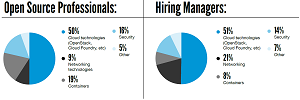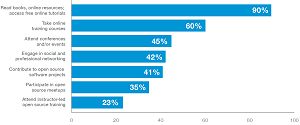News
Here's the New Skills Shortage: Open Source
- By David Ramel
- May 6, 2016
There's a new kid on the skills shortage block, joining the likes of Big Data, mobile development and the cloud: open source.
Hiring managers just can't find enough talent skilled in open source technologies, according to a new survey from careers site Dice and The Linux Foundation, a non-profit governing organization in the open source movement. They set out to investigate trends in open source recruiting and job-seeking and this week published their results in Moving Toward Professionalization: Rising Need for Open Source Skills in 2016 (free download upon providing registration information).
Surveying some 400 hiring managers and more than 4,500 open source professionals, they found a dearth of skilled-up open source developers and other pros, who themselves said interesting projects and cutting-edge tech challenges were far more important than money and perks.
How bad is the skills shortage? Among hiring managers polled, 59 percent are looking for open source talent, and 87 percent say it's hard to come by.
"Companies are experiencing increased demand for open source talent," the survey report stated. "A clear majority, 65 percent, of hiring managers report open source hiring will rise more than hiring in other parts of their business over the next six months, a larger number than in past Linux jobs reports." That last part references previous studies that have been focused specifically on Linux, whose data are included in the new report, but not for the purposes of indicating any direct comparison trends.
 [Click on image for larger view.]
The Most Important Open Source Skills (source: Dice, The Linux Foundation)
[Click on image for larger view.]
The Most Important Open Source Skills (source: Dice, The Linux Foundation)
With more enterprises moving to the cloud, both hiring managers (51 percent) and open source professionals (50 percent) identified the most important open source skills as cloud technologies such as OpenStack, Cloud Foundry and so on.
"With more than nine in 10 Amazon Web Services clouds running Linux, the rising demand for open source skills is clear -- and attracting professionals has proven tricky for hiring managers," the survey report said. "Eighty-seven percent surveyed report difficulty in finding the right skills and expertise, reflecting the intense competition amongst employers in attracting skilled talent."
Looking at the other side of things, open source professionals said the best thing about their jobs is working on interesting projects (31 percent), with "working on the most cutting-edge technology challenges" coming in at second place (18 percent). Apparently, interesting and challenging work outranks salaries and bonuses for these people. "Money and perks" actually garnered the smallest response (2 percent), even behind "other" (3 percent).
 [Click on image for larger view.]
The Best Thing About Being an Open Source Pro (source: Dice, The Linux Foundation)
[Click on image for larger view.]
The Best Thing About Being an Open Source Pro (source: Dice, The Linux Foundation)
Even though they say money isn't that important to them, open source professionals continually rank among the most highly paid tech workers in Dice's series of salary reports, with the vast majority of those jobs related to Big Data or the cloud.
Here's an example of those high-paying jobs:
| Skill |
Category |
Salary |
| HANA |
Databases |
$154,749 |
| Cassandra |
Databases |
$147,811 |
| Cloudera |
Cloud |
$142,835 |
| PaaS |
Cloud |
$140,894 |
| OpenStack |
Cloud |
$138,579 |
| CloudStack |
Cloud |
$138,095 |
| Chef |
Programming Language |
$136,850 |
| Pig |
Big Data |
$132,850 |
| MapReduce |
Big Data |
$131,563 |
| Puppet |
Programming Language |
$131,121 |
Backing up the open source skills shortage and resulting high pay (whether it's important or not) is another survey just published last week by Black Duck and North Ridge, which deemed open source to be "today's pre-eminent architecture, the foundation for nearly all applications, operating systems, cloud computing, databases and Big Data."
To keep themselves skilled up in the workings of that pre-eminent architecture, an overwhelming majority of open source pros (90 percent) rely upon books and online resources, including free tutorials, according to this week's survey. Another 60 percent take online training courses, and 45 percent attend conferences or events.
 [Click on image for larger view.]
How Open Source Pros Keep Skills Updated (source: Dice, The Linux Foundation)
[Click on image for larger view.]
How Open Source Pros Keep Skills Updated (source: Dice, The Linux Foundation)
"In the last decade, open source development has experienced a massive shift: Once a mostly community- and volunteer-based concern, the model has since become a mainstay of the IT industry," the survey report said. "Flexibility in accommodating new technologies and speed at adapting to a changing market have made open source vital to modern companies, who are now investing zealously in open source and open source talent."
About the Author
David Ramel is an editor and writer at Converge 360.